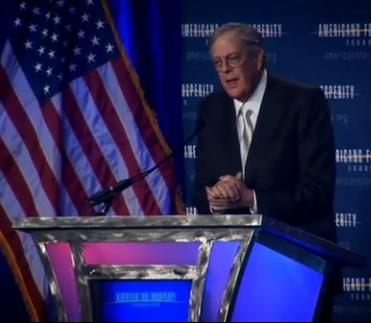I’m somewhat dismayed to see the normally sharp Ezra Klein falling for the goofiest parts of the new Breakthrough/Brookings/AEI report. In fact he seems on the verge of drinking the Breakthrough kool-aid entirely. Consider this my attempt at an intervention. In particular, I want to take issue with the notion that investment is some sort of political skeleton key that can bypass the vicious partisan fighting that’s characterized energy policy these last few decades.
Klein’s use of “bipartisan” to describe the report is technically more accurate than its absurd “post-partisan” self-designation, but almost as silly. What happened is that a couple of self-styled centrists tracked down arch-conservative Steve Hayward at AEI and got him to support (in theory!) spending a bunch of money on energy research as long as it doesn’t increase the deficit.
Big whoop. The signature of a single right-wing think tanker, one of the few left with an independent streak, does not “post-partisan” make. Back in the real world, as Joe Romm notes, Republicans have been working for 30 years to cut funding for clean energy. Just this past session they killed an effort to do exactly what the report suggests — take back some oil company tax subsidies to fund clean energy — on a much smaller scale. As David Dayen notes, right now Republicans are refusing to cough up $25 million for Obama’s proposed energy research hubs. How is $25 million a vicious partisan fight while $25 billion is post-partisan?
So when Klein says, “the politics of [investment] are much better” than cap-and-trade, or when Bryan Walsh says investment has “a much better shot with the right,” I just don’t get it. We don’t have to guess what the politics of this are. We’ve seen it demonstrated, as recently as a few months ago. The politics are: all Republicans in Congress oppose it. The Republican Party don’t want to spend government money on clean energy, Hayward notwithstanding. Why should we pretend otherwise?
It’s worth noting that cap-and-trade began its life as an effort by centrist greens to find common ground with conservatives. They worked together, branded the result a new, post-partisan path forward, and sold Bush I on it. Now it’s viewed as wildly, unacceptably liberal. Why is that? It’s not that the policy changed, it’s that the policy became a genuine threat to the status quo. Thus, money and messaging were marshaled to demonize it. Perhaps there’s a lesson to draw from that episode?
Narcissistic post-partisan fantasies aside, the fact remains that the fossil fuel status quo is politically entrenched, wealthy, and ruthless, and at least for now, the Republican Party is its instrument. That means clean energy is a partisan fight. If Americans of good will ever hope to overcome the status quo and drive real change, it won’t be through cleverly framed policy proposals, it will be as its always been done, through the accumulation and deployment of political power.
It’s a power struggle, not an argument. It will be won through political force, not persuasion. It’s the oldest war in the book, progress vs. status quo, and it doesn’t help matters that so many smart people refuse to fight for, or even associate with, their own side.


